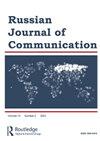Digital behaviour and ethics: performativity of data in Russian media art
Q1 Social Sciences
引用次数: 1
Abstract
ABSTRACT Media art is an intensively developing zone, which allows us to rethink the relationship between data and ethics. More recently, only in Moscow, two major exhibitions took place in which a special role was assigned to media art: Hosting the Inhuman and Synthposium. Lately, participants of the 7th Moscow Biennale were announced. It is noticeable that majority of Russian artists included in this list are closely connected with the field of media art. Which tendencies do problematize digital behaviour and – as a consequence – the ethical dimension of ‘Data Turn’? What is the difference between ‘reflectory’ and ‘reflective’ media art? And in which way nowadays are new types of resources, rethinking the urban cyberinfrastructure, and search for new cognitive effects changing our experience?数字行为与伦理:俄罗斯媒体艺术中的数据表现
媒体艺术是一个蓬勃发展的领域,它让我们重新思考数据与伦理之间的关系。最近,只有在莫斯科,举办了两个大型展览,其中媒体艺术被赋予了特殊的角色:主持不人道和合成。最近公布了第七届莫斯科双年展的参展名单。值得注意的是,上榜的大多数俄罗斯艺术家都与媒体艺术领域有着密切的联系。哪些趋势会使数字行为成为问题,并导致“数据转向”的道德维度?“反思性”和“反思性”媒体艺术的区别是什么?如今,新型资源,重新思考城市网络基础设施,并寻求新的认知效应,以何种方式改变我们的体验?
本文章由计算机程序翻译,如有差异,请以英文原文为准。
求助全文
约1分钟内获得全文
求助全文
来源期刊

Russian Journal of Communication
Social Sciences-Political Science and International Relations
自引率
0.00%
发文量
0
期刊介绍:
Russian Journal of Communication (RJC) is an international peer-reviewed academic publication devoted to studies of communication in, with, and about Russia and Russian-speaking communities around the world. RJC welcomes both humanistic and social scientific scholarly approaches to communication, which is broadly construed to include mediated information as well as face-to-face interactions. RJC seeks papers and book reviews on topics including philosophy of communication, traditional and new media, film, literature, rhetoric, journalism, information-communication technologies, cultural practices, organizational and group dynamics, interpersonal communication, communication in instructional contexts, advertising, public relations, political campaigns, legal proceedings, environmental and health matters, and communication policy.
 求助内容:
求助内容: 应助结果提醒方式:
应助结果提醒方式:


